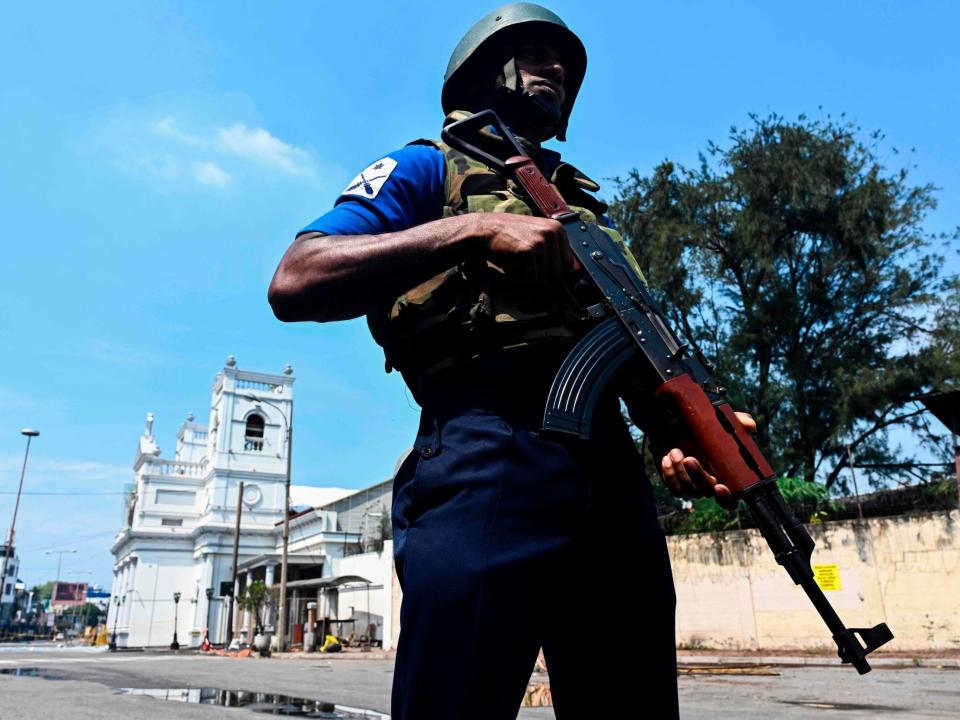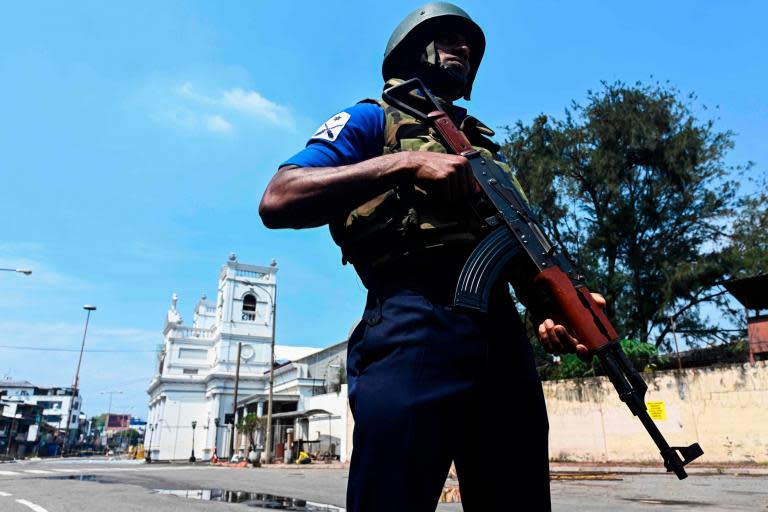Sri Lanka attack planned for ‘months’ as eighth British victim named
The terror cell behind the Easter Sunday bombings in Sri Lanka had been preparing to carry out the attacks for at least three months, authorities said on Wednesday, as the death toll rose to 359 including 39 foreign nationals.
As more details began to emerge regarding the perpetrators of Sunday’s attacks, police spokesperson Ruwan Gunasekara told a news conference 60 people had been arrested on suspicion of links to the bombings, 32 of whom were being interrogated by the central Criminal Investigation Department.
Authorities believe the attackers used two safe houses to prepare for the attacks, one of which was in the town of Negombo where possibly the deadliest bombing took place, at St Sebastian’s Church. Catholic community leaders believe the death toll there alone could rise to 200.
Speaking to The Independent on the sidelines of the news conference, Mr Gunasekara said these safe houses had been occupied by the suicide bombers for “at least two to three months”. There, away from their wives and children, they tested explosives and drew up lists of high-value targets such as places of worship, international hotels and foreign embassies.
Junior defence minister Ruwan Wijewardene said that while planning for the highly coordinated attacks had likely been going on “for some time”, intelligence reports suggested the attackers “were motivated to act now, on Easter Sunday, by the Christchurch attacks”.
Mr Wijewardene did not say what precise evidence showed the Sri Lanka attackers were motivated by the Christchurch shootings five weeks ago, when a lone gunman killed 50 people at two mosques. The New Zealand government has said it has no intelligence directly linking the two events.
But after Isis released images and video purportedly showing the attackers pledging their allegiance, Mr Wijewardene admitted the bombers were connected “through ideology and maybe funding” to the international terrorist outfit.
Investigations continued into whether any of the attackers had travelled to Iraq or Syria, he said. All the bombers, and those arrested afterwards, were Sri Lankan nationals. “We need to find out exactly where they were radicalised.”
Growing attention is focussing on the plush, suburban mansion of a prominent spice trading family with the last name Ibrahim where, as The Independent visited this week, firearms were being removed and at least one woman suspect was arrested.
While the authorities insist it is too soon to name individual suspects in Sunday’s attacks and the precise nature of their jihadi cell, media reports identified two of the bombers as brothers from the spice trader’s home in the Dematagoda neighbourhood of Colombo. The elderly Mr Ibrahim is in police custody.
It was here that the last of the nine suicide bombers to die, and the only woman, detonated a bomb vest as the home was raided by police, killing three officers. Officials said she was the wife of one of the brothers, and though they would not confirm that she had also killed three of her children in the blast, police at the house told The Independent the bodies of two minors had been removed from the scene and a third was thought to be under the debris.
One prominent Muslim business owner said the spice trading community of Colombo was in shock at the development. “It is unbelievable when you think about the people who took part in this, the respected families involved. If you had told us beforehand we wouldn’t have believed it was possible.”
Almost all the attackers appeared to be from well respected, educated, upper middle-class families, Mr Wijewardene said. Some had studied abroad, including one who received an undergraduate degree in the UK and a postgraduate education in Australia before returning to Sri Lanka. “They are financially quite independent, their families are quite stable financially, so that is a worrying factor in this,” the minister said.
As a clearer picture continued to emerge of the scale of the operation behind the bombings, Mr Wijewardene again admitted it had been a “major lapse” on the part of the security and intelligence agencies. “The intelligence had been shared with the right people. This could have been averted or at least minimised,” he said.
President Maithripala Sirisena, whose executive powers include responsibility for defence and security, has asked the country’s police chief and defence secretary to resign over the incident. In an address to the nation, Mr Sirisena said his office had not been informed of the warnings. He also pledged “a complete restructuring” of the security forces.
India’s security services have said they shared intelligence on a possible terror threat, including naming some of the bombing suspects, more than two weeks before Easter Sunday and again in the hours before the attack took place.
The US ambassador to Colombo said on Wednesday that American agents had “no prior knowledge” of a threat but that they now believed there is an ongoing terrorist threat in the country. The FBI is assisting Sri Lankan intelligence with its investigations.
A national emergency has been declared in Sri Lanka, and Mr Wijewardene admitted “there could still be a few people out there”, adding it was too early to say precisely how large the terror network behind the attacks had been.
Tensions remain very high in the country. On Wednesday morning there were alarming reports of a new explosion outside the Savoy cinema in central Colombo, a popular landmark in the city. It later emerged the army’s bomb squad carried out a small, controlled blast to open up a motorbike that had been parked outside the cinema overnight. Nothing suspicious was found inside.
Also on Wednesday, an eighth British victim of the bombings was identified as Lorraine Campbell, a 55-year-old woman from Manchester who was caught up in the blast at the Cinnamon Grand hotel in Colombo.
Her husband Neil Evans said in a statement: “I’ve lost my best friend in the world for all the adventures we shared and planned for the future. Lorraine was a real tour de force, she epitomised the qualities she lived by, and was a conduit for bringing people together to both make things happen and make them better.
“I, Lorraine’s family and friends are in a state of disbelief and grief for what has happened, and as such would respectfully ask that our privacy at this difficult time is respected.”


